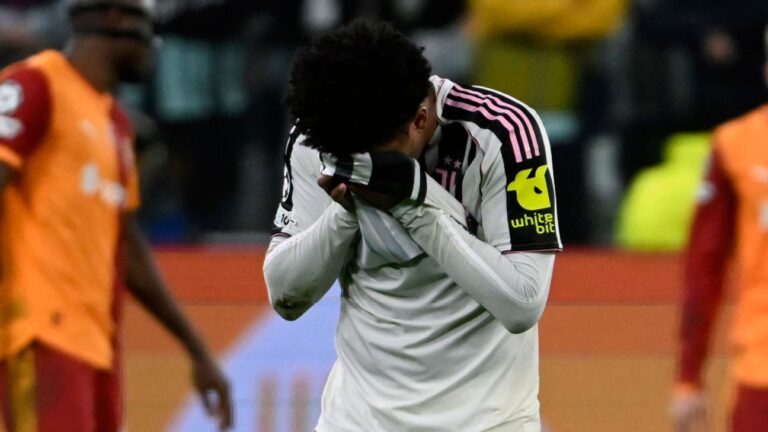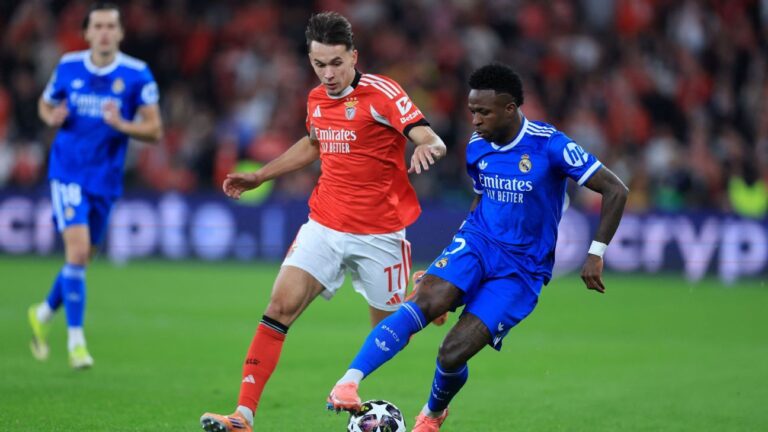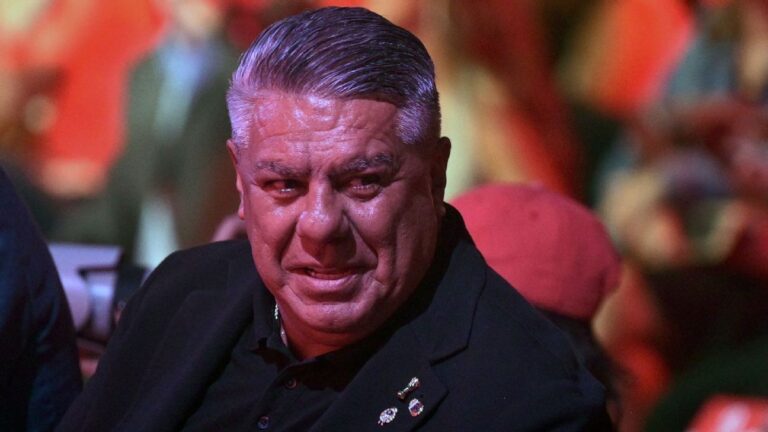As the South American World Cup qualifiers kick off, all eyes turn to Argentina, the reigning world champions. With Lionel Messi still leading the charge, can La Albiceleste maintain their dominance?
Tim Vickery delves into the challenges and prospects of each CONMEBOL nation.
– Stream on ESPN+: LaLiga, Bundesliga & more (U.S.)
– Visit ESPN’s South American WCQ homepage
Plays at home to Ecuador on Thursday, then away to Bolivia next Tuesday
The world champions are the only team in the field whose coach has been in charge for an extended period of time. Lionel Scaloni began his extraordinary five-year reign as a stand-in and ended up taking the team to glory in Qatar, successfully building a team around Messi. Will Messi still be around in 2026? It is soon to say, but he is certainly still around now, the centrepiece of a side which will now undergo a gradual transition, where Nicolás Otamendi (surely) and Ángel Di María (possibly) will be discarded along the way.
The start is not easy. Tuesday’s trip to the extreme altitude of La Paz is a nightmare, and Ecuador’s physicality could provide some problems for the home defence in Buenos Aires on Thursday. But, while almost all their rivals appear to be in a state of flux and frenzy, Argentina can prepare to defend their title in relative tranquillity.
Plays at home to Chile on Friday, then away to Ecuador on Tuesday
New head coach Marcelo Bielsa’s “my way or the highway” approach is already causing ripples, with the controversial absences of Edinson Cavani and Luis Suárez. Predictably, Bielsa has gone with a young squad, a dynamic group of players with the lung power to carry out his high-octane style of play. It is an interesting fit — Uruguay’s Under-20 team have been a consistent supplier of talent for the senior ranks, and in the likes of Federico Valverde and Darwin Núñez there is plenty of quality raw material for Bielsa to work with. But the team will clearly be undercooked. Bielsa used his only two games so far — friendlies in June — to look at fringe players. His Uruguay side might need some time to take shape, but they will certainly be worth watching.
Plays away to Argentina on Thursday, then at home to Uruguay on Tuesday
Ecuador go into the campaign three points behind everyone else — a punishment handed out for suspicions about the paperwork of right-back Byron Castillo in the Qatar qualifiers. They have gone with a Spanish coach, Felix Sanchez, who was in charge of Qatar in the previous World Cup cycle. The fit is obvious. Sanchez shares a similar philosophy to Independiente del Valle, the extraordinary little club which is producing so many players for the national team. The new man has plenty of talent to work with, although the team remain dependent on veteran striker Enner Valencia for goals. Sanchez appears to have bedded in a three centre-back formation, freeing the side to attack down the flanks. Quick, strong and athletic, not many sides will relish facing Ecuador — especially at the altitude of Quito.
Plays away to Paraguay on Thursday, then at home to Brazil on Tuesday
After performing with credit in Russia 2018 and narrowly missing out on Qatar, these are worrying times for Peru. The club game is in a bad way — in the last 11 years no Peruvian side has made it out of the group phase in the Copa Libertadores — and there is a dearth of young talent to replace a generation which has been punching above its weight in recent times. They have turned to former national team captain Juan Reynoso to coach the side. An imposing centre-back in his day and a strong-minded coach, Reynoso would seem to be a good choice, but he has little to work with, and a number of injuries to his defenders will make life harder in these opening two rounds. Peru’s traditional strong form at home will be vital to their chances.
Plays at home to Venezuela on Thursday, then away to Chile on Tuesday
Colombia were the biggest disappointments in the Qatar campaign. After two consecutive good World Cups, they missed out on 2022 — at one point going a scarcely believable seven straight games without scoring. Now they have turned to Nestor Lorenzo, an assistant coach during the good times, and he has made an excellent start — two draws and six wins, including a morale boosting triumph away to Germany last time out. The atmosphere of Colombian football is usually turbulent, and there are always rows and controversies about the call ups. But Los Cafeteros can look forward to this campaign with considerable confidence. With the expansion of the tournament, it would be truly remarkable if such a talented group were to miss out on a second consecutive World Cup.
Plays at home to Bolivia on Friday, then away to Peru on Tuesday
While Brazil await the — unconfirmed — arrival of Carlo Ancelotti next year, Fernando Diniz takes over the team on a temporary basis. There are high hopes that this unorthodox thinker might be a good fit for the national team, but he is hampered by a lack of preparation time — he met his players for the first time this week — and the burdens of Brazil’s crowded club calendar, since his day job is coaching Fluminense in Rio.
There will have to be plenty of last-minute improvisation. It had been thought that this would start a cycle where Vinícius Júnior would be the main attacking weapon. But he is injured, there are doubts about Neymar’s fitness and Lucas Paquetá and Antony have both had to be left out, with the latter released from international duty after the Brazil Football Confederation (CBF) cited domestic violence allegations “which need to be investigated.”
Plays away to Uruguay on Friday, then at home to Colombia on Tuesday
Chile kick off this week with coach Eduardro Berizzo meeting his former mentor Bielsa. But Berizzo is at a clear disadvantage: Where Uruguay have a conveyor belt of talent coming through, the Chilean production line has been spluttering for years. The key players remain the veterans who came through the 2007 Under-20 side and went on to win the Copa America in 2015 and 2016 — Alexis Sánchez, Arturo Vidal, Gary Medel, and other veterans such as Charles Aránguiz and Erick Pulgar. Chile appeared to run out of steam some years ago, and hard though Berizzo is looking, new top-class names are not emerging. Berizzo has cast the net wide, calling up 45 players. If Chile are to make the cut, some of the youngsters are going to have to grow up quickly.
Plays at home to Peru on Thursday, then away to Venezuela on Tuesday
Since reaching the quarterfinals for the first time in 2010, Paraguay have endured three very poor qualification campaigns, but have plenty of faith that this time they are going to get it right. Coach Guillermo Barros Schelotto — yet another Argentine — was in charge for the last few rounds of the Qatar qualifiers and concludes that the experience has given him a much better insight into the Paraguayan mindset. And the Premier League fireworks of Miguel Almirón and Julio Enciso give rise to a faith that scoring goals will be less of a problem this time round, although Enciso will miss the opening two rounds with injury. But with a little bit of attacking flair to go with the legendary Paraguayan fighting spirit, the country will be very disappointed to miss out for a fourth time in a row.
Plays away to Brazil on Friday, at home to Argentina on Tuesday
Domestic Bolivian football is in absolute crisis, with this year’s tournament annulled because of a match manipulation scandal. The national team, however, could be the main beneficiary of the expansion of the World Cup. This is because Bolivia pick up so many points in their mountain fortress, at the extreme altitude of La Paz, that there is always a chance of making the cut. Coach Gustavo Costas is an interesting choice. He has never been glamorous, but all around the continent his teams have always been competitive. Not seen at the World Cup since their golden generation went to USA 94, Bolivia have an excellent chance of returning to the limelight when the United States, Canada and Mexico host the World Cup in 2026.
Plays away to Colombia on Thursday, then home to Paraguay on Tuesday
The only South American team not to have appeared at a World Cup, Venezuela are confident of making their debut in 2026. True, there was a similar feeling in the build-up to the Qatar qualifiers, when the generation that reached the final of the 2017 Under-20 World Cup seemed ready to step up. But everything went wrong last time — especially the fact that the pandemic ruled key centre-forward Salomon Rondon out of most of the early rounds. One problem is that Rondon might now be past his best, but Venezuelan football continues to produce interesting talent, and results under new coach Fernando Batista have been encouraging so far. A good start is essential to morale, and if they pick up early points then a World Cup debut would appear well within Venezuela’s grasp.




